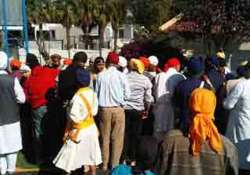Johannesburg Gurudwara opened after 8-year-long legal battle
Johannesburg: The Sikh-community here finally got its own Gurudwara, modelled on traditional architecture from the religious shrines of Indian state of Punjab, after an eight-year-long battle with their white South African neighbours who were opposed

Johannesburg: The Sikh-community here finally got its own Gurudwara, modelled on traditional architecture from the religious shrines of Indian state of Punjab, after an eight-year-long battle with their white South African neighbours who were opposed to its construction.
The Johannesburg Gurudwara, set to become a major tourist attraction in the suburb of Parkmore, was officially opened yesterday with hundreds of guests from the community in attendance.
Harbinder Singh Sethi, a local businessman, has donated the land for the 15 million rand Gurudwara Sahib which had been running on a temporary basis on the site.
Though the plan to construct a Gurudwara ran into trouble after the Parkmore Residents Association objected to the construction of the religious site, with its 91 members alleging that Sethi had initially said he would build a house on the land but then used it for temple facilities.
Executive Manager of the Association, Brian Robertson, said at the time that the residents had objected to the proposed three golden domes on the Gurudwara because “it did not fit into the aesthetic look of the rest of the buildings in the area”.
This has been a common refrain in many areas of South Africa, which were formerly reserved for the white community.
After the first democratic elections in 1994 many Indian-South Africans started moving in these areas and attempted to build mosques and temples there.
After 1994, many Sikhs also came to work and settle in South Africa, resulting in Gurudwaras being built in Durban and Cape Town before the Johannesburg one, which would have been the first in the country had the construction not been delayed due to the various objections.
The new Gurudwara has a prayer hall, an education centre and a food hall which will provide free vegetarian food to visitors and devotees every week.
It will also be open to members of all religious communities to encourage the religious diversity of South Africa as a rainbow nation, Sethi added.